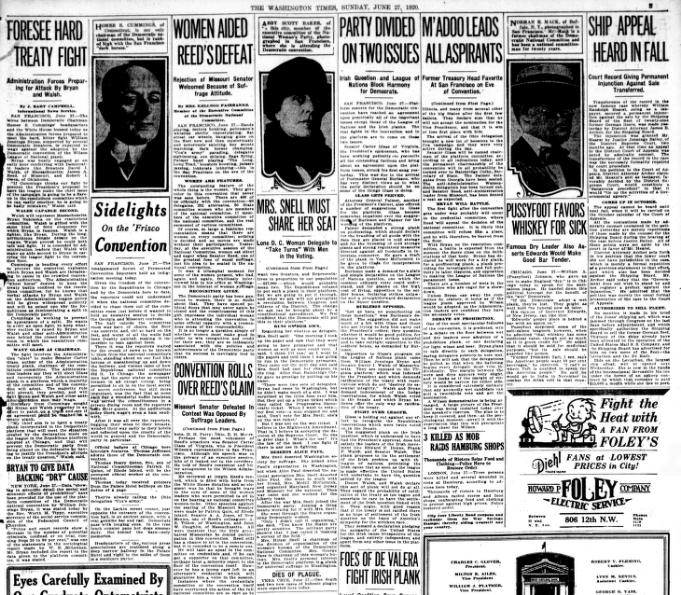|
Moderated by NW Okie! |
Volume 14 , Issue 112012Weekly eZine: (374 subscribers)Subscribe | Unsubscribe Using Desktop... |
Women's Aided Reed's Defeat of 1920

27 June 1920, The Washington Times, Final Edition, page 3, Washington DC, headlines read: "Women Aided Reed's Defeat," Rejection of Missouri Senator welcomed because of suffrage attitude. It was written by Mrs. Kellogg Fairbanks, member of the executive committee of the Democratic National committee.
San Francisco, June 27, 1920 -- "Bands playing, motors honking, policemen's whistles shrilly expostulating, flat street car wheels, banging guns on the fleet now and then mysteriously and sonorously saluting, boy scouts marching, dark horses champing, Cox's army parading, delegates sightseeing, sun shining, flags flying, Palmer band playing the Long, Long Trail, boosters boosting, jazzers jazzing, lobbyists lobbying -- this is the San Francisco on the eve of the convention."
Women Are Features
The outstanding feature of the whole thing was the women. They gave color to this convention that never had been seen before. There were 400 women officially with the convention, 96 delegates, 202 alternates, 50 State committee women who were members of the national committee, 17 members of the executive committee of the national committee, and the rest personnel of various committees.
So large a feminine representation means that there were women on every committee; nothing was decided and no moves are made without their participation. The day before, at the executive session of the National Committee, women sat silent and eager when Senator Reed, one of the greatest foes of equal suffrage, lost his pleas to be seated in the national convention.
It was a triumphal moment for some of the women present, who had, again and again, fruitlessly interviewed him in his office at Washington in the interest of woman suffrage.
Recognition Given
The Democratic party had been generous to women, there was no doubt about that. They had opened political doors that they thought would never have been closed and the consciousness of this gift impressed the individual woman who were attending the convention in some official capacity with a tremendous sense of her responsibility. It is no longer a question simply of whether women must make good in order to win recognition and credit for their sex. They were so intimately associated with the policies and achievements of the Democratic party that its success is inevitably tied to theirs.
Other headlines in The washington Times were concerned with Mrs. Snell and she must share her seat. Mrs. Snell was the lone District of Columbia woman delegate to take turns with men in the voting.
| View or Add Comments (0 Comments)
| Receive
updates ( subscribers) |
Unsubscribe
| © . Linda Mcgill Wagner - began © 1999 Contact Me | |
